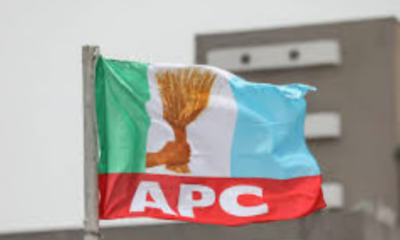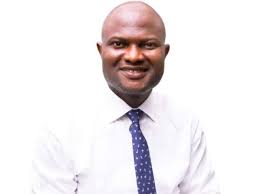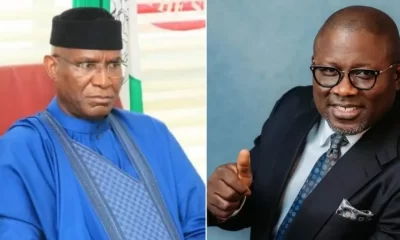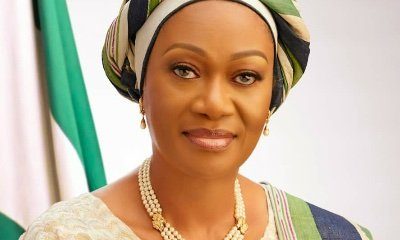Politics
APC re-engineers political machine for conflict resolution
Published
8 years agoon
By
Olu Emmanuel
• Initiates dialogue to avert further intra-party crisis
By SUNDAY ODIBASHI
THE All Progressives Congress (APC) leaders have, for the first time since the 2015 General Elections, lubricated the party’s political machine to intervene in the lingering crisis among members, essentially, the seeming feud between President of the Senate, Dr. Abubakar Bukola Saraki, and the party leadership since the inauguration of the National Assembly.
They are beginning to work towards embracing basic values of democracy, essentially, negotiation, bargaining, tradeoffs and consensus building in regulating intra-party relations. These are indelible attributes of party leadership in post-election era.
The emerging leadership trend in the APC may be a function of deepened political diplomacy by Senate President Abubakar Bukola Saraki to resolve the rift that began from the power competition for Senate leadership.
Since Saraki became President of the Senate, beating the power bloc in APC led by the national leader, Asiwaju Bola Ahmed Tinubu, which sponsored Senator Ahmed Lawan, he has been facing crisis. After all political maneuvers to unseat him failed, the battle seemingly shifted to the court. Hypothetically, the Code of Conduct Bureau (CCB) became a tool to indict and prosecute Saraki at the Code of Conduct Tribunal (CCT) on false declaration of assets.
ALSO SEE: Buhari reworking our collective values and morality — Nwaokobia Jnr
The Senate President had sought the protection of the court on the fear that he will not get justice at the CCT. He aligned his trial at the CCT with political battle over his emergence as the Senate President. Saraki battled from the Federal High Court to the Federal Court of Appeal unto the Supreme Court but did not succeed in halting his prosecution at the CCT. The Supreme Court in its judgement, penultimate week, upheld the jurisdiction of the CCT to handle criminal cases.
With that judgement, political solution became the only option is for APC leaders before the March 10 resumption of the CCT on the suit.
It was disclosed to National Daily that APC leaders weighed the multiplier effects of removing Saraki as Senate President, which may deepen intractable disharmony of interests, lack internal cohesion, among others. They were said to have considered dialogue among the warring factions. It was disclosed that the initiative for dialogue was at the instance of the Vice President, Professor Yemi Osinbajo.
The Leader of the Senate, Senator Ali Ndume, has been in the vanguard of interface with APC leaders and the Presidency to resolve the leadership crisis. Accordingly, Ndume led a delegation of senators to visit the Vice President a fortnight ago, though, the Senate Leader said they did not discuss any matter relating to Saraki. That visit was, however, believed to be harbinger of the diplomatic shuttle for negotiation by APC leaders and senators.
The visit of the delegation led by Ndume to the vice president was subsequently followed by a closed door meeting with Vice President Osinbajo involving Senate President Saraki, former Vice President Atiku Abubakar, APC national leader, Asiwaju Bola Ahmed Tinubu, APC National Chairman, Chief John Odigie-Oyegun, former APC Interim Chairman, Chief Bisi Akande; Ali Ndume, including Deputy Speaker of the House of Representatives, Honourable Yusuf Lasun, Senator Dina Melaye and some other senators. Though details of the meeting were not disclosed but a participant at the meeting was gathered to have admitted that the meeting was trying to settle a serious crisis in the party.
ALSO SEE: APC has made deceit official policy of government — Onovo
The involvement of Asiwaju Tinubu has been considered very important in the consultative meeting of APC leaders. First, Tinubu’s political capital and monumental influence can make remarkable difference in any decision from the party’s political machine.
Secondly, the APC national leader is being perceived to have a hand in the prosecution of Saraki at the CCT. Indeed, Tinubu was at a time accused by Senator JKN Waku of being behind Saraki’s travail at the CCT though, he refuted it. Apparently, Tinubu remains a marked political actor in the new drive for negotiation in the APC.
Tinubu’s trade mark in political crisis became remarkable in the statement by Vice President Osinbajo at The SUN newspaper “Man of the Year Award” in Lagos last week.
Osinbajo had noted that Tinubu is a”trouble maker par excellence”. The vice president had recalled how Tinubu would ask him on certain advisory issues: ”How will you have a job to do if I do not look for trouble.”
It is on record that Asiwaju Bola Ahmed Tinubu has developed high reputation for his sagacity in legal battles for power. He has renowned history on legal victories after losing in political competitions for power. Accordingly, from his political experience as the “Last Man Standing” after the General Elections in 2003, as Governor of Lagos State, Tinubu was the only surviving AC governor in the country. Tinubu, in subsequent elections through legal battles, recovered Osun, Ekiti and Edo states. Thereafter, Oyo and Ogun states returned to Tinubu’s political empire in the South West.
ALSO SEE: APC: Speaking from both sides of the mouth
At the period of the negotiation and formation of the All Progressives Congress (APC), Tinubu was leader of the leading opposition political party in the National Assembly; he invested more political capital into the APC project having more number of governors in the ACN fold. Tinubu remains a portent political force to reckon with in power competition.
APC leaders were said to have subscribed to the common belief that the senate leadership crisis should be resolved to enable the party have cordial and smooth relations between the executive and the legislature.
This is more so, when the defection of some APC senators could skew the majority in favour of the opposition Peoples Democratic Party (PDP).
You may like


Relationship between Oyetola, Omisore remains cordial — Osun APC


Edo 2024: Idahosa writes INEC, claiming APC candidacy


Thugs attack senator in Kogi govt house, six arrested


Edo 2024: APC sells gov nomination form at N50m


Supreme Court reserves judgement on SDP. LP, APC appeals against Oborevwori in Delta


Oluremi Tinubu congratulates Ododo on victory in Kogi gov election
Trending

 Business7 days ago
Business7 days agoDollar crashes further against Naira at parallel market

 Football20 hours ago
Football20 hours agoGuardiola advised to take further action against De Bruyne and Haaland after both players ‘abandoned’ crucial game

 Business7 days ago
Business7 days agoRecapitalisation: Zenith Bank to raise funds in international capital market

 Education7 days ago
Education7 days agoArmy reveals date for COAS 2024 first quarter conference

 Crime7 days ago
Crime7 days agoFleeing driver injures two on Lagos-Badagry expressway

 Covid-197 days ago
Covid-197 days agoBritish legislator demands Bill Gates, other ‘COVID Cabal’ faces death penalty

 Business7 days ago
Business7 days agoZenith Bank surpasses N2trn earnings milestone

 Latest5 days ago
Latest5 days agoIsrael pounds Hezbollah with airstrikes after Iran attack

